I’ve been awfully quiet here lately, but if you’ve been following some of my Facebook posts, you’ll already know why. Today is the launch date of a brand new North and South anthology, Falling for Mr. Thornton! Both Melanie Stanford and I contributed, along with ten other fabulous authors. Some of them you already know well, and some might be new faces to you, but I know you’ll “Fall” for them.
Bad puns aside, I thought I would tell a bit about why I think Fitzwilliam Darcy lovers should have an affair with John Thornton (I promise, I won’t tell the Derbyshire Gent). This was originally posted two years ago on From Pemberley to Milton, but I’ll share it again here.
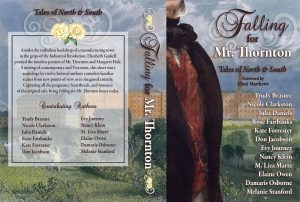 The official Blog Tour starts today at More Agreeably Engaged, with giveaways at each stop.
The official Blog Tour starts today at More Agreeably Engaged, with giveaways at each stop.
Also, check out the buzz over at More Than Thornton about the cover reveal!
Fitzwilliam Darcy vs. John Thornton
By Nicole Clarkston
It is a tremendous disservice to relegate both Pride & Prejudice and North & South to the category of romantic novels and simply leave them there. Both handle issues of far-reaching social impact with delicacy, but today, let us simply sit back and admire the masterpieces who are Fitzwilliam Darcy and John Thornton.
Delicious, aren’t they? What is it about these fictional characters that seems so real to us that I actually fear somewhat for my own safety in labeling them as fictional? Together, they represent two of the strongest, most iconic male characters ever conceived in literature, and, perhaps most fittingly, they were created by female authors. I believe that both Jane Austen and Elizabeth Gaskell have bestowed on us far more than a few hours of entertaining reading. They have crafted paragons of imperfection- men already possessing honor and dignity, but lacking the requisite social skills and humility to win the objects of their hearts’ desires. Both must travel a very hard path, and in the process, they reveal to us some of the secrets of love and humanity.
.
Filling in for Dad
Darcy, as we all know, is wealthy and powerful, the master of his own destiny at a young age, but all that prestige has come at a steep price. He has lost both of his parents, and must now manage his sprawling estate without the continued advice of his father. Everyone has a plan for his life, and so far, he has fallen into step just as he was expected to… but it chafes. He is mortified by all the women seeking his attention, and clearly has never been impressed by any. Though Austen is silent on this point, one begins to think that he would eventually have done his duty and married the least embarrassing and most convenient debutante at hand, simply to secure the required heir. He is certainly taking his time about doing it- perhaps not yet ready to completely fill his father’s shoes? Or could he be searching for something he cannot accurately describe, and has never yet encountered? However, he has his hands full enough without the bother of searching for a wife. In addition to all the expectations on him, he has been betrayed by one he used to consider a friend, and his own sister threw off his protection and put herself in harm’s way. It is a wonder the man is not gray by the time Elizabeth Bennet meets him.
Thornton has also lost his father, in a betrayal that will color all his future relationships with a deep, hidden sense of unworthiness. He spends the next sixteen years trying to bury that shame but has no time to admit that fact, because somewhere in his early adolescence, he had suddenly become the sole provider and head of the family. Thornton has neither the luxury nor the burden of a fortune and a great estate dumped into his lap. Rather, he contends with the family’s disgrace over his father’s suicide and debts, and one imagines that the boy never has a chance to properly mourn his lost father. He is driven by both pride and ambition, and devotes all his energies to raising his family from poverty to prosperity. This, I think, is where Thornton really stands out. Gaskell gives us hints that Mrs Thornton had once come from good family, but their change in circumstances at George Thornton’s death is not one which was easily reversed. The hard-working young John Thornton, however, defies the odds. Unfortunately, he has learned to measure his worth by what he has achieved. By the time he meets Margaret Hale, he has become well-regarded and wealthy, and is starting to think that maybe, just maybe, he might finally have earned the right to be loved.
I find it interesting that both men have been forced into a position of authority at a young age by the loss of their fathers. Both also find themselves responsible for their younger sisters, who give evidence that the gravity of life’s experiences has been quite masterfully spared them- perhaps to their detriment. Both men have at last come to a place where they feel comfortably in control of their fortunes, despite their own looming worries about traitorous friends or pending labor strikes. Both, however, are deeply private men, and likely very lonely men, ripe for overpowering infatuations with women who might be their intellectual equals.
The Crush
Darcy has no intentions of finding any woman appealing in that crowded country dance. There are none of his social sphere- hard as Caroline Bingley tries to persuade him otherwise. No woman in that room is even a candidate for the title of Mrs Darcy, until one walks away from him. Over their first several encounters, Darcy is repeatedly fascinated by this woman who seems not to be in pursuit of his purse, and who possesses the wit to close his mouth on more than one occasion. Elizabeth stands out not because she makes an effort to, but because her very nature is in such stark contrast to everything he has already grown weary of. He cannot help watching her, and learns that she is generous, ladylike, and well-read- all qualities which he admires. She is also devastatingly clever, and will not suffer insults in silence. He grows to respect her able, poised defense of herself, but her sparkling good humor and genuine zest for life may be the final blow to his denial of feelings for her. She is everything he lacks, and unlike anything he has ever seen, but oh, her family! The world is not fair.
Thornton is a tradesman- a manufacturer, lest we overlook that distinction- and as such, his society is not considered worthy of many of the gentry. Milton, however, is his own particular little kingdom, and here, the manufacturers reign. There is some confusion about whether he, a man of resources and authority, is on lesser, equal, or greater footing than the penniless gentlewoman he encounters. He is used to having his way, but Margaret coolly puts him in his place at their first meeting (which is different in the book, as this post explains beautifully). She is clearly not intimidated by him, demanding his respect immediately, but he is well and truly gobsmacked by her grace and beauty. He becomes rather tongue-tied in her presence, which must surely be a new experience for him, and does little to impress her. She represents everything that he has long been working for- she is elegance, serenity, and gracious ease; the very living evidence of the kind of security he has been longing to provide and at last thinks he might have earned.
Throughout their early acquaintance she challenges his opinions, and though naïve, her intelligence inspires him to desire her respect. He tries to earn it, but the harder he tries, the more she scorns him. Thornton’s mother claims that other women were interested in him, but apparently he has never bothered with them. One wonders if his early experiences learning at the knees of his strong, determined mother might have taught him exactly what sort of woman was worthy of his regard. Unfortunately, he can sense from the beginning of their acquaintance that Margaret considers him unworthy of hers. This haughty Southern maid both repels and captivates him, and he spends each encounter bouncing between indignation and breathless adoration.
So, here we have two men who are ostensibly great catches for a marriage-minded young lady, but have proven rather elusive. The authoresses leave the readers to conclude that their heroes cannot be satisfied by a marriage of convenience, and that it will take a remarkable woman to jar them from their complacency. These women turn out to be somewhat unconventional, intelligent, and possessed of rather unique charms which manifest as astonishing beauty in the eyes of their enraptured beholders. Their attractions are on every level- physical, emotional, intellectual, and in Thornton’s case, even spiritual. In both cases, our gentlemen fight tooth and nail not to succumb- in the first case to a woman beneath Darcy’s notice, and in the second to a woman who considers Thornton beneath hers. It has been said that in North & South, the Pride was Margaret’s, and the Prejudice was Thornton’s. That observation is, perhaps, not at all inaccurate.
The Shoe Leather
When Darcy finally overcomes all his own objections to Elizabeth’s connections, he anticipates that she will accept him immediately. Oh, Darcy. Many a treatise has eloquently detailed why he never expected a refusal, but refuse him she does- mercilessly and jaw-droppingly. In apologizing for the delay in his confession of love, he manages to offend her so thoroughly that she clubs him over the head with a verbal ton of bricks before he escapes the parsonage that day. Ouch. Never has Mr In Control of the World been so humbled. She is wrong, entirely wrong, about everything! Isn’t she? Surely, a nice, civil letter will help clear things up. He scurries back to London with his tail between his legs, but at the very least, hopefully he has put to rights some of her misapprehensions. Sadly for poor Mr Darcy’s wounded pride, he is forced to admit that the only woman he has ever wished to impress also happens to be the only woman to see him for what he truly is- a man of too much conceit for his own good.
Thornton, in his more rational moments, knows very well that Margaret would never have him. Unfortunately, his judgement becomes a little hazy whenever he is around her, and for some while he has been privately watching her and fantasizing about her. All it would take to set off the powder keg of his growing passion is a simple sign from her that she might not despise him. When she feels compelled to shield him from his own workers, believing that her femininity provides her a natural, sacrosanct safeguard of sorts, she does so without considering what he might think of her motives, and with just as much pity on the workers as on the unprotected Thornton. Thus, when he shows up at her door the next day to thank her and to do what he considers his duty as a gentleman, she righteously slaps him down. The ensuing argument is glorious and deliciously highlights the stark contrasts in their ways of thinking. Thornton goes away heartbroken, but vowing to love her still. Margaret feels as though her innocence and dignity have been stripped away because her lofty motives have been mistaken for something so vulgar as affection for a man she does not like. Really, she doesn’t like him. At all.
Oh, the misunderstandings! The reader can see clearly from the beginning that the characters would complement each other in ways which even they do not yet fully comprehend, but those ladies are having none of it. Elizabeth is offended that Mr Darcy thinks he can insult with impunity, and still believe he is doing her a favor by offering his hand. Money cannot buy this girl, which we cannot help but admire, even though at the same time we shake our heads at her stubbornness.
Mr Thornton and Margaret’s argument is subtler. Margaret has never really come to terms with her own feminine maturity or the fact that she might be an object of desire. She is scandalized that Thornton could think she wished to protect him personally, finding such an emotion abhorrent to her maidenly sensibilities. She later confesses to herself that there was something of a spark there, else how could she have found such courage in the face of danger? Mostly, however, she feels that she acted out of sacrificial honor despite her personal feelings, and she certainly does not need him messing things up by claiming love for her. In addition, marrying Thornton for the security he might offer rankles, because in her mind, he is a giant social step beneath her, and in effect, she would appear to be marrying him for improper reasons.
The White Horse
Austen never gives us any indication that Darcy confessed his failed proposal to anyone. Plenty of authors have since toyed with that entertaining notion, but in the original, Darcy keeps his stiff upper lip and goes back to the business of living without Elizabeth Bennet. Apparently he is not doing a very good job of it, because at their next encounter, he is anything but composed. He sees at once that his letter has improved her view of him somewhat, and almost immediately he sets out to win her good opinion once more. Things might have continued rather swimmingly, until Wickham decided to take a holiday with Elizabeth’s younger sister. Darcy’s subsequent actions are why we all love him. He patches it all up and saves the day, but he doesn’t want Elizabeth to know about it. He doesn’t want her gratitude, because he senses that along with it might come a feeling of obligation, and eventually, resentment. He does want to restore her family’s dignity with a minimal amount of fanfare, so he goes about it quietly. He sets out on his mission knowing that she may forever be beyond his reach.
Thornton tries to go on with life too, but only after assuring himself that there is no other woman out there to equal the one he has lost. He refuses to allow his mother to abuse Margaret in his hearing, immediately taking upon himself the blame for her refusal. Clearly, he was not worthy, and he knew it beforehand. Slowly, Milton goes back to “normal” after the strikes, but Thornton has a new outlook on his business. Margaret has held a mirror to his face, and he does not like what he saw there. As he is processing his new ideas, he discovers Margaret in a compromising situation. Though he believes her lost to him and devoted to another, he steps in to save her from legal troubles because he cannot bear to see her come to harm.
His involvement is both a blessing and a curse, for now Margaret sees his inherent goodness, but his knowledge of her own personal fall from grace drives yet another rift between them. The modern audience is more caught up in Thornton’s misapprehension regarding the identity of Margaret’s companion at the train station that evening. Thornton naturally takes the man to be Margaret’s suitor, when, in fact, he was her embattled brother. This shakes Thornton and leaves him sick with jealousy, but the real damage to his regard comes when she lies about her presence at the station. He had been used to at least respecting Margaret’s nobility- which, incidentally, is the very virtue she claimed to hold over him at his failed proposal. Watching her trade her integrity for the sake of concealing that mysterious other man becomes an ongoing source of agony for him.
Unbeknownst to our favorite fellows, their fair maidens are both tormented with regret by now. Darcy and Thornton have begun to show themselves as men of purest honor, too good to behave resentfully when they had every right to. We want to shake them all- force them into the same room, bolt the door, and refuse to let them out until they have talked things through. Of course, that is not the way of the world, and by this point, we have four very anguished souls pining for the ones who got away. For the ladies to go to them and apologize for their grievous errors would be the vilest display of immodesty, and both Elizabeth and Margaret are feeling as though they have already sunk low enough in their loves’ eyes. Darcy and Thornton, for their parts, are quite simply too terrified to try again. They have learned the hard way that they were not all that they had considered themselves to be, and their new humility prevents them from reaching out at a number of points.
Humble Pie
Seeing Elizabeth and her family returned to respectability is possibly all Darcy can hope for. At least he settles the matter knowing that she is safe, and that he has done what he can to secure the family’s future. Elizabeth has the option again to marry, with her prospects no less limited than they had been before. In other words, she is now freed up to find someone else. In another attempt to right his own wrongs, Darcy encourages Bingley to return, and even attends his friend… you know, just to assure himself that he has done right by Bingley and Jane. Really, that’s all. Most distressingly for poor Darcy, he has no idea if Elizabeth is happy to receive him, or wishes him on another continent. Our shy hero goes back to staring at her and making her uncomfortable again. Darcy, Darcy….
Unfortunately for poor Thornton, Margaret is the least of his troubles. The month-long strike disrupted the flow of commerce in Milton so badly that nearly all the businesses are suffering. Thornton is behind on orders and income. Where once his mill had shown tremendous promise, now he is struggling for capital. Blow after blow then falls- he loses his only true friend, Mr Hale. As a consequence, the woman whose very presence in Milton is both inspiration and misery for him removes to London. He has lost all connection to her, until, most humiliatingly, Mr Bell also dies and leaves Margaret his heir. The penniless woman who had disdained him before now becomes his wealthy land lady, and has even more reason to look down on him. Thornton is at length faced with the prospect of confessing to her that he must give up his lease, but at least by this time he has learned the truth about her brother. Sorry that he has misjudged her, and knowing there is little chance for reconciliation, he makes the humbling journey to London where he will permanently sever ties with her.
The darkest chapters of the books are where our gentlemen shine the brightest. This is love as it was meant to be- putting aside one’s own interests to look after the welfare of another. Not only have they proved that they never were the heartless malefactors that their fair ladies had once taken them for, but they have also made tremendous strides to improve their already honourable characters. Both feel they owe it to their own sense of dignity to become the man their lady deserves, although both have by now given up hope. By stepping in and saving their ladies from disgrace at the hands of an imprudent relative, each might have had an opportunity to collect on her gratitude, but they refuse to stoop to that level. They do not stop there, though. Each makes a meek “final” journey from the North to see their lady one last time, setting right their affairs. It is likely that each bore a spark of hope, but it was not a strong one.
The Only Sensible Outcome
Well, we all know how a proper story must end, but in both cases, the final reconciliation is positively delicious- fraught with nerve-wracking angst, and at long last, joyous surrender. Apologies and forgiveness abound, and lingering feelings of shame are washed away. I shall not detail those scenes for you- either you have not read them and I do not wish to spoil them, or you have… and I do not wish to spoil them. Let me only say that the tender passion, tempered with the excruciating restraint of the period, is simply exquisite in both cases. We have glimpses- very little ones, mind you- of the strength of the couples’ new attachments, and even little peeks into a budding sense of play as it develops. It is a travesty long lamented that neither authoress returned to her story to pen a sequel- in fact, Gaskell was forced to cut hers entirely too short for our taste. We are left wanting more. And more.
So what is it about those two imaginary characters that makes them, to us, the absolute definition of gentle manhood? To love, passionately and uncontrollably, is at the same time their greatest vulnerability and their most profound strength. We adore that these two men, who both thought themselves quite the masters of their own destinies, fell flat on their faces when confronted with the kind of women whom even other women can admire. We swoon over their heartbreak, gasp our approval when we see them striving to better themselves, and rejoice when their loves finally see them for who they really are.
I dare not pick a favorite. Not only would my mind change as soon as I encountered yet another delightful take on one of these lovely gents, but I would likely offend the other man’s very loyal audience! I admire both so completely. It has been my privilege to borrow these characters from their original creators, continuing to torment and examine them from new angles. They are each an absolute fascination, and happy is the woman who finds her own Fitzwilliam Darcy or John Thornton.
Falling for Mr. Thornton is available now through Amazon, Apple, Kobo, Barnes & Noble, and Google.

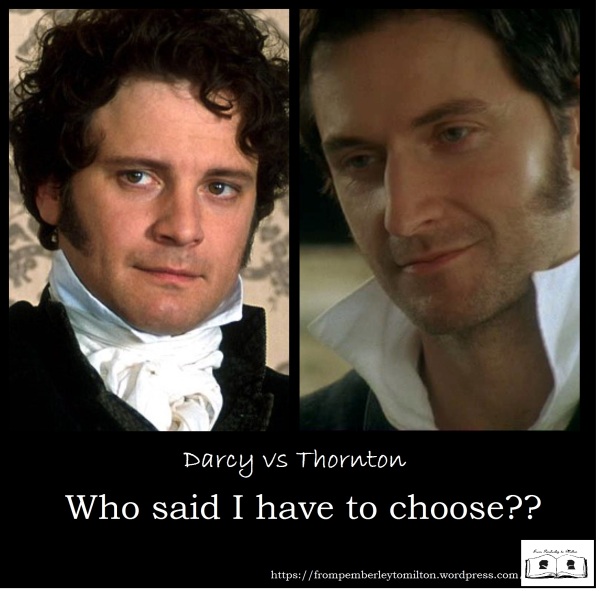




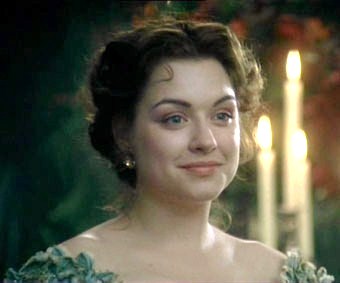

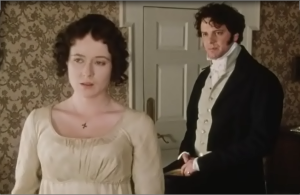






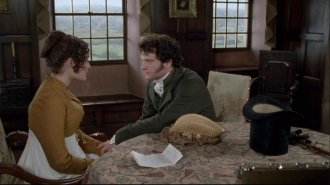




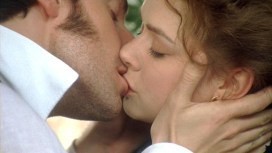


28 comments
Skip to comment form
I am stumped. They are both dreamy. But Thornton is way less arrogant.
Author
Perhaps it’s “earned arrogance?” He certainly worked for it! They are both lovely gents, though. Thanks for commenting, Frances!
This makes me want to reread North and South , which I haven’t read in years. I really enjoyed your thoughtful analysis of both men. Thank you!
Author
Oh, it’s so worth a re-read! I hope you love it as much this time as before.
Which would I choose? 🤔 Well, I am notoriously bad at making decisions so I’m sorry but I will have to have both! 😋🥰🥰 (lucky me!) 😉
Author
Good choice, Glynis! Who doesn’t need a bit of posh some days and a bit of grit on others? I say take two <3
Yay! I’m so excited for this book. I am going to publicly admit that I still have not read North and South. But I have seen the miniseries…swoon! Time to hit the library and read then classic first, then on to this lovely collection.
Author
The miniseries is a gateway drug! It should come with warning labels. I hope you love Gaskell! She is a powerful writer.
Like you, Nicole, I admire both hero and heroine from each book. I see them exactly as you have explained them. Honor in a man is a beautiful thing. Thank you for this piece. Your new release is next up on my read pile. I cannot wait! Happy launch!!!
Author
Thank you, Joy! These men are just so remarkable. A quality man is a fine and precious thing, and an estimable woman even more so. They are all easy to fall in love with.
What a lovely treatise! Perfect and evocative, I just adore your writing and will certainly enjoy Fallling as well!
Author
Thank you, Nicole! I hope you love this collection. There are so many different angles on this marvelous Mr. Thornton, we had to try to find them all! Thank you for your sweet words. <3
While you have done an excellent comparative analysis Ms Clarkson, it does not preclude the fact that EVERYONE SHOULD READ THE BOOKS. Too often we come across film adaptations that, while good in themselves and often add their own unique value, NEVER make up for the content of what is in the book. This travesty is more known with North and South than P&P. But the, I would say, lesser film perspectives limit the imbiber from absorbing the true qualities brought through the pages of what is written. Personally, I find the kiss in the serial North and South is the best thing to have ever graced the movie/tv world in general. But I think the greatest tribute to these heroes and heroines is to locate the source and appreciate them for all their nuances as written by the fantastic authors whose very words brought them to life. READ THE ORIGINALS PEOPLE!
Author
Absolutely, read the books! No adaptation can possibly capture everything in the book. There will be inevitable flaws, but in both these cases, at least the movies are balanced enough to capture the heart of the tale. But truly, if you aren’t reading the gorgeous prose by either of these authoresses, your life is not complete.
Of course, after reading those, fan fiction tribute reading becomes mandatory lol
Author
Yes!
Yes, you must read the books. I read and loved this anthology and have posted my review…although with so many stories it was difficult to get deep into any one of those. I did love the angst in your tale, Nicole. I love both men and have watched the railroad platform scene (even though it is not part of the book) numerous times. I just have to sigh deeply. It is one of the best endings on film in my opinion!
Author
I am so glad, Sheila! It was fun to write and even more fun to read what everyone else wrote. Yes, that platform scene was to die for! It’s our private guilty pleasure because we all know it would never have happened, but we sure want it to! Pure magic.
I love Mr. Thornton so glad to see this release.
Author
I’m excited for you to read it!
Beautifully said and so hard to chose. Each have their own magnetism that pulls at my heart. Again, I ‘fell for Mr. Thornton’ after reading this collection. Congratulations to all involved!
What perfect timing!! I’ve been in a great deal of pain lately, so my habit is to return to a book with which I have already read more than once so that even the distraction of the pain can’t derail me from reading a book I know so well. And the book I have been re-reading at this time of mental unclarity is No Such Thing as Luck, one of your incredible North and South variations.
I am excited about the anthology!! It looks absolutely wonderful, and I can’t wait to read it!! Plus, I really enjoyed re-reading this article on Darcy and Thornton; they truly are two peas in a pod. Perhaps we can add in Mr. Rochester, too, although he is not as upright (at first) as Darcy and Thornton, has also taken up the mantle for a father figure, one who also betrayed him. He is trapped and bitter, much more so than Darcy and Thornton who start out as flawed but much better men. Rochester also changes for the better during Jane’s absence. I have long viewed these three as a triad of (eventually) ideal men in 19th century British literature written by women authors.
Thank you, Nicole!!
Warmly,
Susanne 🙂
P.S. I hope the above post makes sense. I have no idea right now if it did or not!! :/
~SB 🙂
Oh my, what a comparison with pictures. thank you for sharing. i am not familiar with Mr Thorton, but now have a better idea. He sounds interesting.
North and South made no impression like Pride and Prejudice to me. I love Mr. Darcy, he gives me hope to think there is something good in people instead the outer shell. But you make me think, it’s time to read North and South again.
Thank you for this very interesting article about two men written from ladys in a time long ago. How easier is this today for talented authors like youself to be published. Maybe I give
Mr. Thornton a try.
What a wonderful piece! You’ve captured why I love them both <3
There are so many parallels in the stories that I always wondered if Elizabeth Gaskell was a fan of Austen. All through the book the parallels in story are obvious, although Gaskell’s writing is very different from Austen’s and is threrefore wonderful as totally original. What do you think? Was she a fan of JA and influenced by the storyline to write North and South?
I love both books and both mini-series. I’ll take Darcy or Thornton any day of the week – whoever will have me.
Aaahhh, man! Don’t make me choose!! I’m afraid it will have to be Darcy over Thornton since I’ve been reading P&P longer. I finally read N&S because many of my GoodReads friends recommended it. I mainly read it because I wanted to better understand the fanfiction variations. I had read one of your excerpts, Nicole and I wanted to understand the background history. So, I read it. It was hard reading [mainly due to the language] but I made it. I didn’t really fall in love with the story until I read your ‘No Such Thing as Luck’. That book set me on the variations path. I love reading the love story between Thornton and Margaret. I am looking forward to reading this collection.